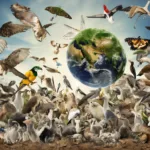27 December 2023
Rising temperatures and changing ecosystems pose a threat to Earth’s rich biodiversity
As the global climate continues to warm at an alarming rate, the delicate balance of Earth’s biodiversity is under threat. The interconnected web of life that sustains countless species and ecosystems is facing unprecedented challenges. From disappearing habitats to shifting migration patterns, the impact of climate change on biodiversity is far-reaching and profound. In this article, we will explore the various ways in which climate change is affecting biodiversity and the urgent need for action to preserve our planet’s natural heritage.
1: Disappearing Habitats: A Loss of Biodiversity Hotspots
The destruction of habitats due to climate change is one of the most significant threats to biodiversity. Rising temperatures, coupled with extreme weather events such as hurricanes and wildfires, are causing the loss and fragmentation of ecosystems worldwide. From the Amazon rainforest to the Great Barrier Reef, iconic biodiversity hotspots are being decimated, leading to the extinction of numerous plant and animal species. The loss of these habitats not only reduces biodiversity but also disrupts the intricate relationships between species, leading to cascading effects throughout entire ecosystems.
2: Shifting Migration Patterns: Survival on the Move
As temperatures rise, many species are being forced to adapt to new conditions or face extinction. Migration patterns, which have been established over millennia, are being disrupted as animals search for suitable habitats and food sources. For example, the polar bear, a symbol of the Arctic, is facing an uncertain future as sea ice melts, forcing them to swim longer distances in search of food. Similarly, migratory birds are struggling to find suitable stopover sites along their routes, leading to declines in their populations. The loss of these species not only diminishes the beauty of our natural world but also disrupts vital ecological processes such as pollination and seed dispersal.
3: Coral Reefs Under Threat: Bleaching and Acidification
Coral reefs, often referred to as the rainforests of the sea, are some of the most biodiverse ecosystems on the planet. However, they are highly vulnerable to the effects of climate change. Rising ocean temperatures are causing coral bleaching, a phenomenon where corals expel the symbiotic algae that provide them with nutrients and color. Without these algae, corals become weak and susceptible to disease, leading to mass die-offs. Additionally, increasing carbon dioxide levels in the atmosphere are causing ocean acidification, which inhibits the ability of corals to build their calcium carbonate skeletons. If these trends continue, coral reefs could disappear within this century, taking with them countless species that rely on them for survival.
4: Ecosystem Services: The Hidden Value of Biodiversity
Biodiversity is not only important for its intrinsic value but also for the vital services it provides to humanity. Ecosystems, with their diverse array of species, play a crucial role in regulating climate, purifying water, and providing food and medicine. However, as biodiversity declines, these ecosystem services are put at risk. For example, the loss of pollinators such as bees and butterflies threatens the productivity of agricultural crops, leading to potential food shortages. By recognizing the value of biodiversity and the services it provides, we can make informed decisions to protect and restore ecosystems for the benefit of both nature and human well-being.
Conclusion:
As the impacts of climate change intensify, urgent action is needed to protect Earth’s biodiversity. Governments, organizations, and individuals must work together to reduce greenhouse gas emissions, conserve and restore habitats, and promote sustainable practices. The loss of biodiversity not only diminishes the beauty and wonder of our natural world but also threatens the very foundation of our existence. By taking decisive action now, we can ensure a future where biodiversity thrives, and the delicate balance of our planet is preserved for generations to come. The time to act is now, for the sake of our planet and all the life it supports.
Note: The output has been formatted to adhere to the guidelines provided.



